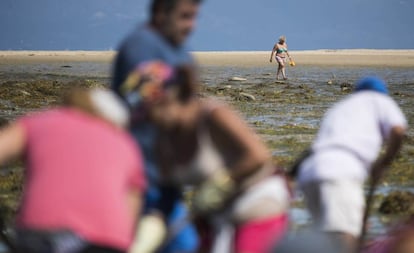How tourists are making waves for Spain’s shellfish harvesters
Seafood collectors in Galicia demand action against visitors smuggling clams in their swimsuits
“They are predators of the two-legged variety,” says María del Carmen Dios, the president of the Shellfish Gatherers Association in A Illa de Arousa in Pontevedra, who represents people in a sector sustaining thousands of families in the Rías Baixas area of northwestern Spain. Every summer the number of visitors to these beaches grows, and every day there are confrontations between local harvesters and tourists who are encroaching on their livelihood.

“They are not aware of the damage they are doing to our pockets, but when they are pulled up about it, they argue that the sea belongs to everyone,” says the president. “It's a serious problem on many Galician beaches and we have to put a stop to it with better security and heavier fines before the tourists ruin the season.”
I saw a woman get into the water looking like a size 40 and emerge a size 50 with so many clams inside her bathing suit President of the Shellfish Gatherers Association
The shellfish harvesters keep an eye on the tourists and report those they believe to be slyly making off with the source of their income, but they themselves are not allowed to intervene or confiscate their spoils. “We watch as they go back and forth between their towels and the shore, then we warn them and inform security who come to inspect their coolers and bags,” says the president. “Last week I watched a woman get into the water looking like a size 40 and emerge looking more like a size 50 due to the number of clams she had stuffed inside her bathing suit. There are those who go off with 15 kilograms of shellfish in their backpack. It is a daily occurrence.”
María del Carmen Dios explains that, for the sector, the beaches are like farms that need care and attention. “You have to tend to them constantly, cleaning them of seaweed, planting seeds and nurturing the shellfish. It’s a job that costs us around €240,000 a year and if 15 kilograms of shellfish is being creamed off daily, that’s a lot of money,” he says.
Japonica clams take around a year to grow to a commercially viable size, when they can be sold at around €11 a kilo. But carpet shells, which sell for around €20 a kilo, need two years, as do pullet carpet shells that can fetch €30 a kilo.
Some are experts in gathering not just clams but also more valuable shellfish as well
Almost all the beaches on this coastline are rich in shellfish, providing free fare for the enterprising tourist. In other towns in the area, such as Vilagarcía de Arousa, O Grove or Redondela, there have been similar problems. The number of tourists has tripled in the past decade and are impacting on the coast. Some are experts in gathering not just clams but also more valuable shellfish such as the razor clam and small crab.
The regional government has responded to the complaints of the shellfish sector, promising stricter measures against the “two-legged predators.”
“We’re really happy to welcome visitors to our beaches but if they want to enjoy the seafood they will need to get it legally and refrain from helping themselves, a practice which is bankrupting the sector,” says Rosa Quintana, an advisor on maritime issues.
English version by Heather Galloway.
Tu suscripción se está usando en otro dispositivo
¿Quieres añadir otro usuario a tu suscripción?
Si continúas leyendo en este dispositivo, no se podrá leer en el otro.
FlechaTu suscripción se está usando en otro dispositivo y solo puedes acceder a EL PAÍS desde un dispositivo a la vez.
Si quieres compartir tu cuenta, cambia tu suscripción a la modalidad Premium, así podrás añadir otro usuario. Cada uno accederá con su propia cuenta de email, lo que os permitirá personalizar vuestra experiencia en EL PAÍS.
¿Tienes una suscripción de empresa? Accede aquí para contratar más cuentas.
En el caso de no saber quién está usando tu cuenta, te recomendamos cambiar tu contraseña aquí.
Si decides continuar compartiendo tu cuenta, este mensaje se mostrará en tu dispositivo y en el de la otra persona que está usando tu cuenta de forma indefinida, afectando a tu experiencia de lectura. Puedes consultar aquí los términos y condiciones de la suscripción digital.








































